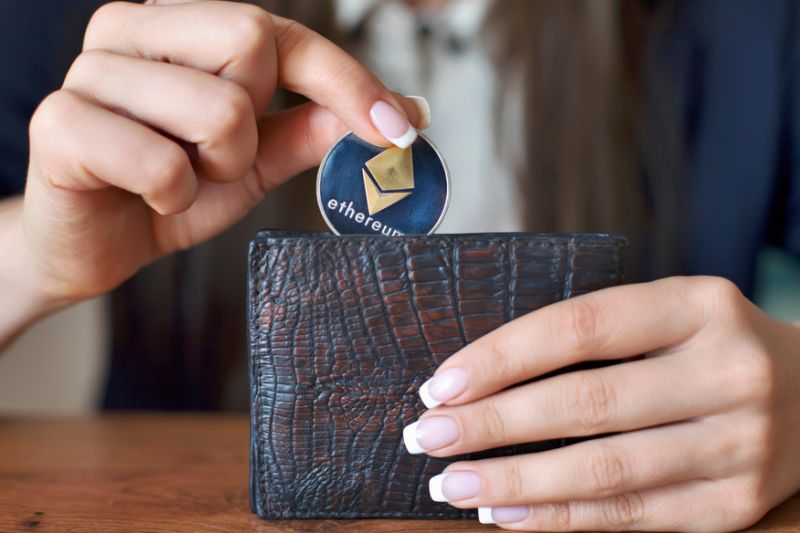£0.00

September 1, 2019
When trading or dealing with cryptocurrency, users need a wallet to hold their Ether tokens. There are various cryptocurrency wallet types for Ether token storage –5 of which we shall review in this article below. But before we do, let us first understand how Ethereum wallets work.

How do Ethereum Wallets work?
Ethereum wallets are different from regular wallets. These store private keys instead of Ether tokens. The private keys allow access to Ether tokens recorded on Ethereum blockchain. If the user misplaces/loses the wallet and private keys, then all ether tokens are also lost. This is why it is essential to take all the necessary steps to ensure their safety and opt for the most suitable wallet for your Ether tokens.
Receiving Ether Tokens on Ethereum Wallets
Confused as to how Ethereum wallets receive the Ether tokens? Well, in addition to private keys, each wallet also has a public key. This is obtainable by anyone. It is mainly the address users use to send and receive cash. The public key allows all users to track your transaction history as well as check your current balance. However, it can’t give anyone access to your private information or allow them to withdraw any cash from your ether wallet.
Types of Ethereum Wallets
- Online wallet
- Desktop wallets
- Mobile wallets
- Paper wallets
- Hardware wallets
Third-party Wallets and Private Wallets
All Ethereum debit cards come attached to an online wallet. This is a third-party type wallet which is tied to a debit card site or exchange firm.
On the other hand, private wallets come in various types such as desktop, mobile, paper or hardware wallets. They are entirely the user’s personal wallet and don’t share any third-party intervention from an exchange or debit card site. Let’s take a brief look at their working below.
Desktop wallets
Desktop wallets are applications installed on a desktop computer. Although safe in general, there is always the risk of the computer breaking down, leaving the user helpless at recuperating the files. This also means you will lose your Ether tokens. Atomic Wallet is a kind of desktop wallet.
Mobile wallets
Like desktop wallets, mobile wallets are installable applications on a phone. There are multiple Ethereum wallet apps on iOS, the App Store or Google Play. Once installed, these apps convert the phone into an Ethereum wallet. There are also some apps that offer wallet synchronization with other devices but not all. If the user loses the phone and the wallet isn’t synchronized to any other device, this means all the Ether tokens will be lost.
Paper Wallets
A paper wallet is the most basic kind of Ethereum wallet. Even though it is labelled as a paper wallet, it can be any lifeless thing you draw your private key onto. Papers wallets eliminate the dangers of technical issues. They can also take the private key offline when required. The only drawback of paper wallets is that they can be misplaced, stone or lost.
Hardware Wallets
Hardware wallets are most preferable for those who wish to safeguard themselves from any third-party, desktop or mobile wallet threats and scams. This is one reason why many call it a sensible investment. As the name suggests, a hardware wallet is a device which holds your private keys –a lot like a flash drive. Another perk is that hardware wallets allow users to go offline whenever needed. This also limits the chances of hacking and loss of data. Ledger Nano S is an example.
Full node Wallet
These wallets are also desktop wallets containing all the data from the Ethereum Blockchain. To use a full node wallet, the user needs to download copious GB of data. Once the installation is complete, the desktop becomes an active node that validates Ethereum blockchain transactions. In case you wish not to download the fill node wallet, then you will have to partner with some other node without the whole blockchain.

Hot vs. cold wallets
Hot and cold wallets are technical terms for online and offline wallets. Many users prefer hot/online wallets due to their easy access. However, this case also comes with a price. Hot wallets are most prone to scams and hacks. Conversely, cold wallets are more secure in nature but less effective.

12 Comments
… [Trackback]
[…] There you can find 96959 more Information on that Topic: coinmercury.com/id/dompet-ethereum/ […]
… [Trackback]
[…] Find More here on that Topic: coinmercury.com/id/dompet-ethereum/ […]
… [Trackback]
[…] Read More Information here to that Topic: coinmercury.com/id/dompet-ethereum/ […]
… [Trackback]
[…] Read More on to that Topic: coinmercury.com/id/dompet-ethereum/ […]
… [Trackback]
[…] Find More Information here on that Topic: coinmercury.com/id/dompet-ethereum/ […]
… [Trackback]
[…] Read More to that Topic: coinmercury.com/id/dompet-ethereum/ […]
… [Trackback]
[…] Information to that Topic: coinmercury.com/id/dompet-ethereum/ […]
… [Trackback]
[…] Find More here on that Topic: coinmercury.com/id/dompet-ethereum/ […]
… [Trackback]
[…] Read More on on that Topic: coinmercury.com/id/dompet-ethereum/ […]
… [Trackback]
[…] Here you can find 15496 more Information to that Topic: coinmercury.com/id/dompet-ethereum/ […]
… [Trackback]
[…] Here you will find 23166 more Information on that Topic: coinmercury.com/id/dompet-ethereum/ […]
… [Trackback]
[…] Info on that Topic: coinmercury.com/id/dompet-ethereum/ […]